Infections STI's/STD's
Commonest sexually transmitted infections (STIs) seen at Regent Street Clinic Updated August 2016
Sexually transmitted infections (STIs) are increasingly common in the UK and the number is rising annually.
Last year, there were nearly half a million new cases of STDs reported from clinics across the UK. This increase is undoubtedly because more and more people are having active, but sometimes risky, sex lives – often with several partners.
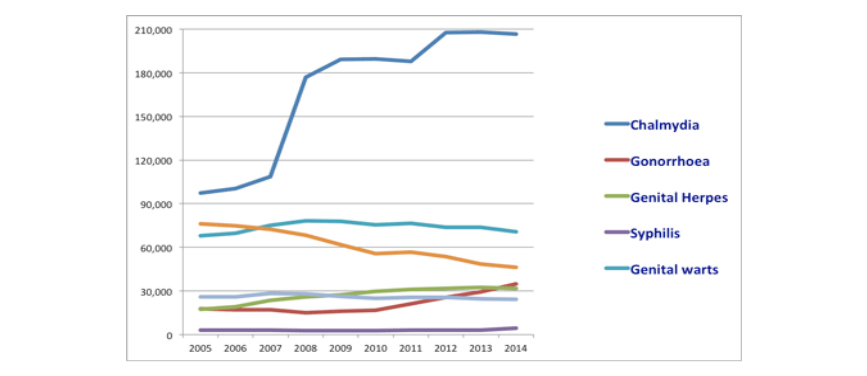
Which infections are we talking about?
Below you’ll find a number of conditions that are currently being seen by genitourinary medicine (GUM) clinics in the UK. Please bear in mind that some of them (most notably thrush) may not have been acquired through sex.

Chlamydia
There are over 200,000 new people diagnosed with chlamydia in the UK each year. Countless others have the infection but they do not realise it.
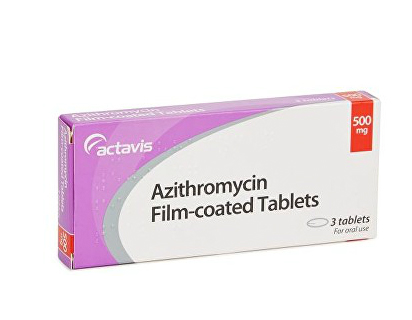
Gonorrhoea
There are around 30,000 new cases of gonorrhoea a year in the UK. This number has risen steadily over the past 10 years and has jumped up by an astonishing 53% since 2012. Gonorrhoea is caused by Neisseria gonorrhoeae, a bacterium that grows and multiplies quickly in moist, warm areas of the body – such as the cervix, urethra, mouth, or rectum. The cervix is the most common site of infection in women.
However, the disease can also spread to the Fallopian tubes and other internal genital organs, causing such conditions as salpingitis and pelvic inflammatory disease.
These may lead to to infertility. Gonorrhoea is most commonly spread during genital contact, but it can also be passed from the genitals of one partner to the throat of the other during oral sex. New multi-resistant strains of gonorrhhoea are causing particular concern with “super strains” of the bacteria proving difficult to treat.
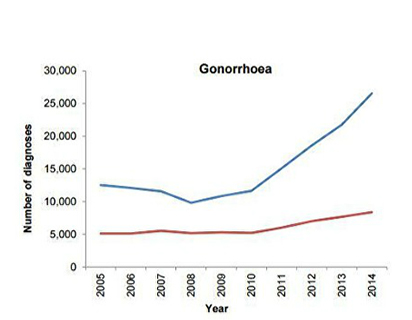
Genital herpes
There are over 200,000 new people diagnosed with chlamydia in the UK each year. Countless others have the infection but they do not realise it. Chlamydia is the most common and fastest-spreading sexually transmitted disease in the UK.
It’s caused by a bacterium, Chlamydia trachomatis. Unfortunately, many people (particularly females) have no symptoms at all. Where symptoms do occur, they may include pain in passing urine and a discharge. They usually appear approximately 7 to 21 days after infection. Chlamydia can cause problems with fertility in men and women as well as a reactive arthritis and eye problems.
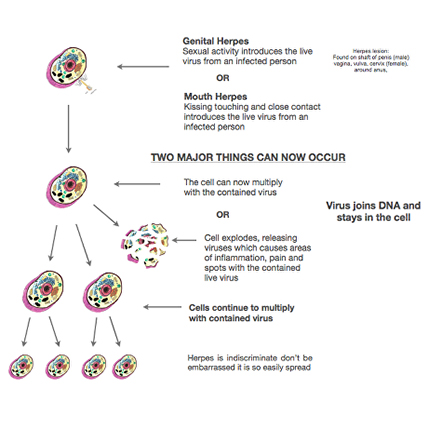
HIV - 'human immunodeficiency virus'
UK data for 2014 reveals that there were 6,151 new cases of HIV. Of these, 55% of cases occured in men who have sex with men (MSM). The Health Protection Agency estimates that currently there are over 103,000 people in the UK who are HIV-positive, but around a quarter of them do not know that they have the virus. Some of those who are HIV-positive will go on to develop AIDS and its complications.
AIDS is a potentially fatal disease. HIV invades and destroys the immune system, which protects the body from infection. This means that a person who carries the HIV virus is prone to many different illnesses and may die from diseases that are harmless to healthy people.
In some countries, particularly those located in Sub-Saharan Africa, the HIV rates are very high. For instance, in the Republic of South Africa it’s estimated that about 11 per cent of the population is HIV-positive.
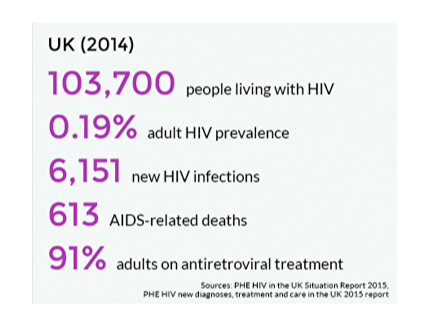
Genital warts (HPV)
At the present time, UK clinics see about 100,000 new cases of genital warts a year. Many other people develop warts, but they are not seen at clinics. Warts, or condylomata acuminata, are caused by the human papilloma virus (HPV).
Many months can pass from the time of infection to the actual development of warts, so it may be very difficult to determine who you got them from. In women, HPV can lead to microscopic changes in the cervix and to the development of cervical cancer.
HPV is now thought to be associated with various other cancers, including carcinoma of the anus and possibly of the throat and adjoining regions

Syphilis
Public Health England reports a 76% increase in the number of cases of syphilis in the UK since 2012. If left untreated, syphilis is a dangerous and life-threatening disease. It’s caused by a corkscrew-shaped germ called Treponema pallidum. It’s passed on by intercourse or by almost any other form of sexual interaction.
The first symptom appears between 9 and 90 days after exposure to the germ that causes it. A small lump develops at the infection site, and this soon breaks down to form a painless ulcer called a chancre.
Later, there is a secondary stage (characterised by fever, rashes and throat ulcers), and eventually a tertiary stage in which the bacteria attack the brain, spinal cord and other organs, which can be very serious, leading to stoke, paralysis, blindness and even death.
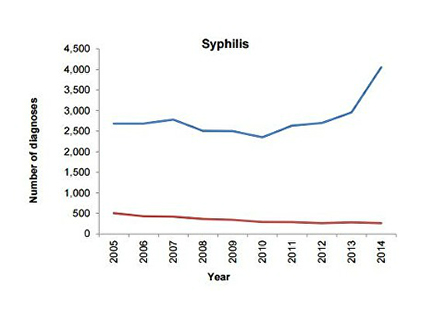
Trichomonas Vaginalis (TV)
Trichomonas vaginalis (often known as ‘TV’) is a protozoan ‘bug’ that affects the vagina.
It causes a green or yellowish, bubbly vaginal discharge and intense vulval soreness. It also produces a ‘fishy’ smell. However, some women have no symptoms at all, and men rarely do.
For unknown reasons, the incidence of ‘TV’ in the UK has declined sharply in recent years, though it is reported as still being common in the USA. Only about 6,000 cases were diagnosed in UK clinics last year. In addition, a substantial number were treated by GPs.
Bacterial Vaginosis (BV)
The diagnosis of bacterial vaginosis (BV) has become common during the last 10 years, with about 97,000 women per year being seen in GUM clinics, and an unknown number being treated elsewhere.
BV is a common cause of vaginal discharge. The discharge is usually whitish or greyish or sometimes yellowish, and tends to have an off-putting ‘fishy’ odour.
Unlike the discharges caused by thrush or trichomonas, it’s not usually associated with soreness, discomfort or itching. It’s uncertain if BV is transmitted sexually, especially as there’s no equivalent condition in males.
Private Medical Services
| HIV Test |
£100 |
Blood test sent to our private laboratory from day 28. |
| Instant HIV Test |
£100 |
HIV test from day 28 with result within 5 minutes |
| Basic STI screen (male and female) |
£295 |
HIV, hepatitis B, chlamydia, gonorrhoea, syphilis and urine analysis. |
| Chlamydia Test (free gonorrhoea test too) |
£95 |
Urine test |
| Herpes Test |
£150 |
Blood test or skin swab |
| Premier sexual health screen |
£495 |
Ultimate peace of mind screen. HIV, hepatitis B, chlamydia, gonorrhoea, syphilis, mycoplasma, ureaplasma, trichomonas, gardnerella (bacterial vaginosis), herpes I/II and urine analysis. |
| Early detection screen for HIV, Hepatitis B and Hepatitis C |
£295 |
From day 10 post exposure |
| Genital wart treatment with cryotherapy |
£75 |
Liquid nitrogen cryotherapy |

